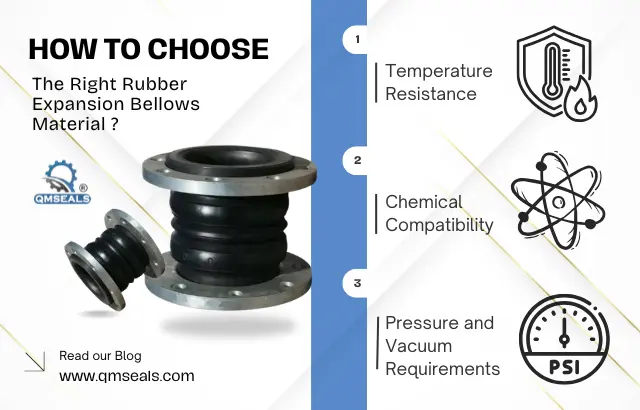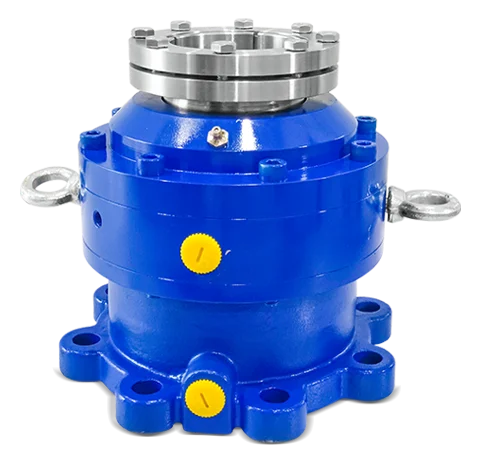Posted At: Mar 14, 2025 - 1,104 Views

How to Choose the Right Rubber Expansion Bellows Material
Rubber expansion bellows are a key part in different industrial applications, imparting flexibility, vibration reduction, and misalignment compensation to piping systems. They find application in industries including oil and gas, power generation, water treatment, chemical processing, and HVAC. Choosing the right rubber expansion bellows material is imperative for optimum efficiency, reliability, and durability, along with protection from environmental factors. This handbook will take a look at the various materials used for rubber expansion bellows, the characteristics of each, and how to best choose one based on your specific application requirements.
Knowing the Purpose of Rubber Expansion Bellows
Rubber expansion bellows are connectors that accommodate movement, account for thermal growth, and minimize mechanical stress in piping equipment. They are an important protection against damage from pressure fluctuation, vibration, and piping component misalignment. Material selection has a major impact on the function and durability of rubber expansion bellows, and therefore it is important to know the nature of each rubber type before settling on one.
Common Materials of Rubber Expansion Bellows
A variety of rubber materials are utilized in the production of expansion bellows that provide distinct properties to meet varying conditions of operation. It is easier to choose the appropriate one for particular industrial applications based on the understanding of these materials.
Natural Rubber (NR)
Natural rubber is among the most widely used materials for rubber expansion bellows because of its superior elasticity, resilience, and abrasion resistance. It performs very well in applications where mechanical properties like tensile strength and elongation are essential. Natural rubber is limited when it comes into contact with oils, solvents, and
high temperatures and is not suitable for high-temperature or chemically aggressive environments.
Neoprene Rubber (CR)
Neoprene rubber has excellent resistance to oil, chemicals, ozone, and weathering. It is used in applications needing moderate resistance against harsh conditions. Neoprene rubber expansion bellows are most often used in HVAC, marine, and industrial applications where the presence of oil-based products is prevalent.
EPDM Rubber (Ethylene Propylene Diene Monomer)
EPDM rubber is very resistant to weathering, ozone, and UV radiation, which makes it a good material for external use. EPDM also has better resistance to hot water, steam, and some chemicals and is used extensively in power plants, water treatment plants, and HVAC systems. EPDM cannot be used where petroleum-based solvents and oils are involved.
Nitrile Rubber (NBR)
Nitrile rubber is particularly suited to provide strong resistance against oils, fuels, and chemicals, and hence is used where petroleum products are involved. It is predominantly utilized in applications in the oil and gas industry, the automobile sector, and the chemical processing industry. It has modest resistance against ozone and UV exposure, and therefore additional protection may be needed in open applications.
Silicone Rubber
Silicone rubber is very temperature-resistant, ranging from -60°C to 200°C, and thus perfect for high-temperature use. It finds vast applications in food and beverages, pharmaceutical processing, and aerospace products. Silicone-based rubber expansion bellows are flexible but may not be recommended in high-pressure services because they possess lower tensile strength than some other rubber.
Fluoroelastomer
Fluoroelastomer, also known as Viton, exhibits superior resistance to chemicals, especially to aggressive chemicals, acids, and fuels. It is most often utilized in chemical processing facilities, refineries, and high-temperature applications where regular rubber
products will fail. Viton based rubber expansion bellows are strong but more costly than others.
Butyl Rubber
Butyl rubber is exceptionally impermeable to gas, thereby proving useful in applications where air and gas handling systems are involved. It also shows superior ozone, weathering, and aging resistance. Butyl rubber expansion bellows finds applications in HVAC systems, chemical processing, and industrial air ducts.
Things to Note When Selecting Rubber Expansion Bellows Material
Temperature Resistance
The operating temperature of a system is an important factor in the selection of suitable rubber material. When the application requires exposure to elevated temperatures, materials like silicone or fluoroelastomer would be suitable. For low-temperature conditions, natural rubber or butyl rubber could be considered.
Chemical Compatibility
Rubber expansion bellows usually come into contact with a variety of chemicals, such as acids, alkalis, fuels, and solvents. It is crucial to select a material that will be able to resist the given chemical environment so that premature deterioration is avoided. Nitrile rubber is widely suggested for applications involving oil, whereas EPDM is ideal for water and steam-related environments.
Pressure and Vacuum Requirements
Various rubber compounds possess different pressure resistances and tensile strengths. Strong materials such as fluoroelastomers are needed for applications under high pressure, whereas low-pressure systems can be applicable to EPDM or natural rubber.
Environmental Conditions
Outdoor uses demand that the materials should have high resistance to ozone, UV, and weathering. EPDM and butyl rubber are very suitable for outdoor usage because they are more resistant to environmental conditions. Nitrile rubber, however, can become less durable after exposure to sun and ozone.
Flexibility and Vibration Absorption
Applications that need exceptional flexibility and vibration dampening, like power plants and HVAC systems, must use materials with high elasticity. Natural rubber and silicone rubber are very flexible and are the best to use in such applications.
Types of Temperature Can Be Used in Rubber Expansion Bellows Material?
Rubber expansion bellows are vital parts of piping and mechanical systems used to dampen vibrations, take up thermal expansion, and lower mechanical stress. The operating temperature range that can be handled by these bellows is based on the kind of rubber material they are made of.
Expansion bellows made from natural rubber and EPDM (Ethylene Propylene Diene Monomer) are popular owing to their ruggedness and versatility. EPDM rubber expansion bellows usually resist temperatures from -40°C up to 120°C, for which they find applications in HVAC systems, water treatment plants, and general-purpose industrial uses.
For applications at elevated temperatures, Viton and Silicone rubber expansion bellows are the choice. Silicone bellows have a temperature tolerance of 200°C, and Viton bellows can operate effectively in environments up to 250°C, making them suitable for chemical processing and high-temperature industrial processes.
Neoprene rubber expansion bellows are used in most moderate-temperature applications, having a temperature tolerance of -20°C to 100°C, providing resistance to oils and some chemicals.
The selection of the appropriate rubber expansion bellows material according to the temperature requirements guarantees longevity, flexibility, and best performance in industrial and commercial use.
Application-Specific Factors for Rubber Expansion Bellows:
Industrial and Chemical Processing Plants
Chemical processing plants need rubber expansion bellows with the ability to endure exposure to aggressive chemicals and high temperatures. Fluor elastomer is usually the most suitable option because of its outstanding chemical resistance and durability.
Oil and Gas Industry
In gas plants and oil refineries, nitrile rubber is employed extensively because of its enhanced resistance to petroleum fluids. It maintains long-term performance in tough conditions and stops leaks and system failures.
Water Treatment and Power Plants
Power plants and water treatment plants usually employ EPDM rubber expansion bellows because of their high resistance to steam, hot water, and exposure to UV. This provides long-lasting durability in tough conditions.
HVAC Systems
For HVAC purposes, neoprene rubber and butyl rubber are widely applied due to their superior flexibility, vibration damping, and resistance to air and gas exposure.
Food and Pharmaceutical Industry
Silicone rubber is the material of choice for food and pharmaceutical applications owing to its non-toxic nature, high-temperature stability, and food safety compliance.
Conclusion
The proper selection of rubber expansion bellows material is vital to ensuring the efficiency, safety, and lifespan of industrial systems. By looking at elements like temperature resistance, chemical compatibility, pressure demand, and environmental conditions, industries are able to make well-informed choices that improve performance and lower maintenance costs. Be it EPDM for water treatment, nitrile for oil and gas, or silicone for high-temperature use, the correct material is essential in optimizing the function of rubber expansion bellows in any system.
Frequently Asked Questions
1. What are rubber expansion bellows, and why are they applied?
Rubber expansion bellows are elastic connectors that take up movement, vibrations, and heat expansion in piping systems. They minimize stress on equipment and make the system more durable.
2. What do I need to consider when making a selection for rubber expansion bellows material?
The appropriate rubber expansion bellows material is selected based on temperature resistance, chemical compatibility, pressure rating, and flexibility for your particular application.
3. What are the most common materials for rubber expansion bellows?
EPDM (heat- and chemical-resistant), Neoprene (oil-resistant), Nitrile (fuel and oil service), and Natural Rubber (general-purpose use with good flexibility) are typical materials.
4. How do I select rubber expansion bellows for high-temperature use?
For hot temperatures, Silicone rubber expansion bellows and EPDM are good options since they can resist heat up to 150°C or more without losing flexibility and durability.
5. Can rubber expansion bellows be used in chemical applications?
Yes, provided the material is compatible with the chemicals in the system. Viton and EPDM rubber expansion bellows have good chemical resistance for use with acids, alkalis, and industrial chemicals.


